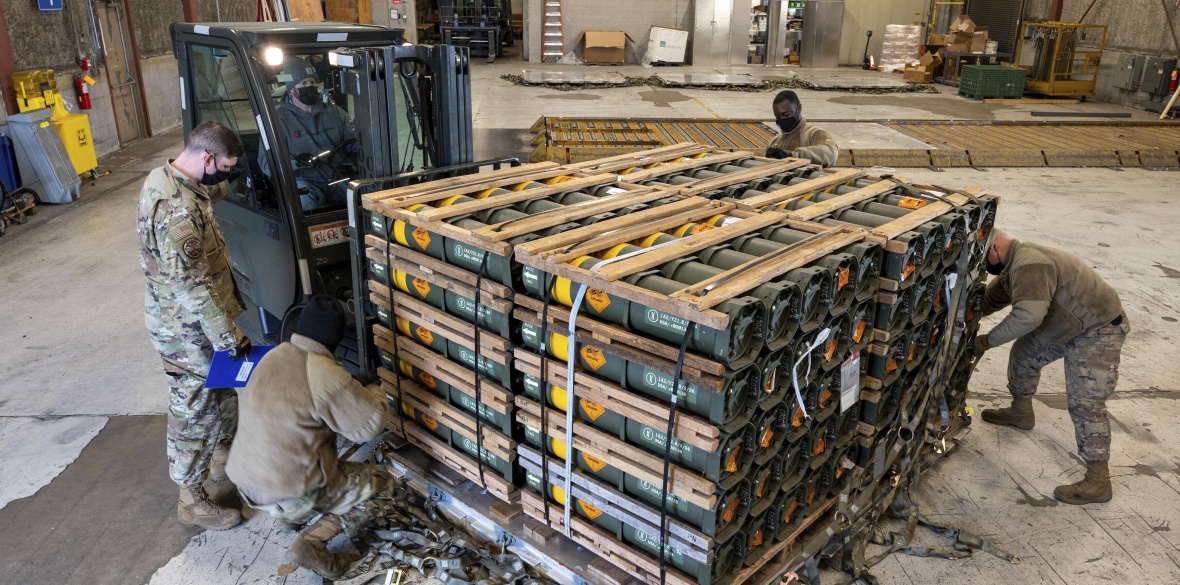This is the last article you can read this month
You can read more article this month
You can read more articles this month
Sorry your limit is up for this month
Reset on:
Please help support the Morning Star by subscribing here
THE US and its Nato allies are already in a panic over a potential energy crisis in Europe should Russia cut off gas supplies in an apparent effort to dampen European support for Ukraine in the ongoing dispute between the two former Soviet countries.
But the wringing of hands over gas supplies misses the greater danger: there are 15 nuclear reactors in Ukraine providing about 50 per cent of the country’s electricity.
Vulnerable to accident or sabotage, a major release of their radioactive inventories could render large areas of Europe uninhabitable.
As a December 28 2021 article in Forbes warned us, these nuclear plants, if destroyed in the conflagration of war — should Russia actually invade Ukraine — could yield potentially devastating results, effectively “a nuclear war without bombs.”
The March 2011 triple disasters in Japan serve as a potent reminder of just how much an already perilous situation can become orders of magnitude worse, once you introduce deadly amounts of radioactive releases into the equation.
The 2011 Tohoku earthquake and tsunami fatally disabled the Fukushima Daiichi nuclear plant, hampering rescue operations due to the high levels of radiation released by the subsequent triple meltdowns.
How many lives were lost in the earthquake or tsunami that might have been saved had first responders been able to safely enter those disaster zones?
If conflict rages in a region where nuclear power plants are located, the personnel working there cannot simply abandon them.
This was the terrible dilemma faced by Fukushima owners, Tepco and then Japanese president, Naoto Kan, who insisted that the workforce at the stricken plant stay in place at the risk of their lives.
Abandoning Fukushima Daiichi to a major runaway meltdown would have forced the evacuation of the nearby Fukushima Daiini nuclear power plant, which would then also have melted down, escalating a chain reaction of catastrophes necessitating the evacuation of Tokyo. That, Kan said later, would have been the end of Japan as a nation.
However, nuclear power plants are not the only radiological concern should the Russia-Ukraine tensions progress into all-out warfare.
Ukraine no longer has its nuclear weapons, all of which were returned to Russia after the collapse of the USSR.
But Russia still has 6,800 nuclear weapons including a land-based force of roughly 760 intercontinental ballistic missiles, carrying 3,629 nuclear warheads.
Would Russian President Vladimir Putin be insane enough to use them? History would suggest not.
Wars and conflicts in Vietnam, Iraq, Afghanistan, India, Pakistan and elsewhere have been fought by nuclear powers on one or both sides without using that deadly force.
But these conflicts have not been deterred by the possession of nuclear weapons among combatant countries, either.
Our leaders aren’t helping. Russia’s threats to Ukraine and the bristling US-led build-up of Nato armaments on the border are doing nothing to ease tensions and only worsen the likelihood that Ukraine’s nuclear plants could find themselves literally in the line of fire.
As Charlie Chaplin articulated so brilliantly back in 1940 in The Great Dictator, it would be better if the misguided megalomaniacs who run far too many countries in this world, would stop warmongering and concentrate on a collective effort to save humanity.
These days, that means from the looming disaster that is the climate emergency.
But the reality is that we are a war-like species. Nothing in our history suggests we are evolving on this front, even if most of us actually abhor war.
We continue to elect leaders who are all too willing to lead us headlong into one.
Therefore, removing everything that could make the consequences of a war even more deadly is an urgent imperative.
That means abolishing nuclear weapons, but it also means closing and dismantling nuclear power plants. And it most certainly means a halt to any further development and expansion of nuclear power, especially in volatile regions like the Middle East.
We may yet escape the Armageddon of a true nuclear war — but if we don’t abolish nuclear power, we could still see that “nuclear war without bombs.”
Linda Pentz Gunter is a writer based in Takoma Park, Maryland. She is the international specialist at non-profit organisation Beyond Nuclear (Twitter: @BeyondNuclear).










